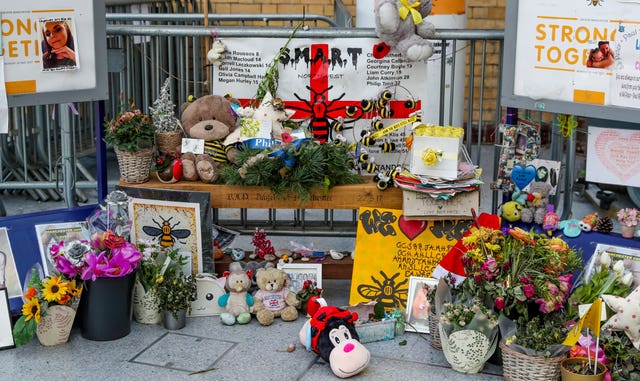
A firefighters union is hoping to play a key role in the public inquiry into the Manchester Arena bombing, but recommendations were made for their application to be rejected.
The Fire Brigades Union (FBU) submitted an application for core participant status in the inquiry, which is set to begin on September 7.
If successful, it will allow FBU members to obtain advance disclosure of evidence, make statements at certain hearings and apply to ask questions of certain witnesses.
A preliminary hearing on Tuesday, which took place via videolink, heard the FBU made the application for core participant status on March 23, four months after the deadline on November 20.
Paul Greaney QC, counsel to the inquiry, said the application lacked merit and should be refused.
He said: “If this application is granted, it may well generate further applications from organisations, including representative organisations, and individuals who feel they can make late applications for core participant status with impunity.”
Mr Greaney said the interests of the FBU “coincides substantially” with other existing core participants and “with the aims of the inquiry team”.
He continued: “The FBU’s interests are broadly in ensuring that failings by Greater Manchester Fire and Rescue Service (GMFRS) and/or North West Fire Control (NWFC) are investigated, criticism of firefighters is justified by the evidence and recommendations are made, are necessary and appropriate.
“Those interests are shared by at least the inquiry team, bereaved families and Greater Manchester Combined Authority (GMCA) and quite possibly by the NWFC as well.

“The FBU therefore do not have a unique interest or a different perspective to all other core participants.”
But Hugh Southey QC, representing the FBU, disputed this, arguing that if the firefighters’ employer GMFRS had core participant status through the GMCA then so should the employees through the union, which represents the majority of fire brigade staff in the UK.
He said: “It is firefighters who are expected to put their lives at risk on the basis of policies which may potentially change as a result of this inquiry – that is a very significant interest.”
He said FBU members have expertise of what would work, and that in many work environments there has been a “history of disagreement between management and union as to how to respond to this kind of incident”, which can also be said of the fire service.
He added: “The reality is that there is every reason to believe that recommendations will be made that will have an impact on the working conditions of firefighters.
“The FBU should be given core participant status so that we can play a full role in the development of those recommendations.”
The inquiry’s chairman Sir John Saunders said he will make a decision on the application at a later date.
The public inquiry, set out to focus on the people who lost their lives and the circumstances leading up to the attack, was initially set to start on June 15 but was delayed due to Covid-19.
Salman Abedi, 22, detonated a rucksack bomb in the foyer of the arena, known as the City Room, at the end of an Ariana Grande concert on May 22 2017, killing 22 bystanders and injuring hundreds more.
His younger brother, Hashem Abedi, 22, was convicted of 22 counts of murder at the Old Bailey in March.
Survivors of the terror attack were refused core participant status earlier this year, after an application made on behalf of 56 people was turned down on April 21.


Comments: Our rules
We want our comments to be a lively and valuable part of our community - a place where readers can debate and engage with the most important local issues. The ability to comment on our stories is a privilege, not a right, however, and that privilege may be withdrawn if it is abused or misused.
Please report any comments that break our rules.
Read the rules here